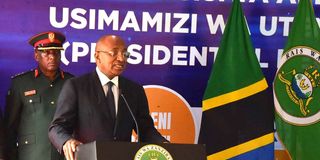Of what importance is Zanzibar’s Presidential Delivery Bureau?

President Mwinyi during the launch of PDB
By Mohamed Mansour Nassor
Instrengthening the government’s delivery capacity to achieve the vision for transformation and sustainable development of the isles,President Hussein Ali Mwinyi established a Presidential Delivery Bureau (PDB)
An organ with a mandate to co-ordinate and accelerate implementation of the government’s strategic priorities and delivery of results for social-economic transformative impacts in Zanzibar.
PDB was launched by President Mwinyi on December 2, 2022.
The Presidential Delivery Bureau is an institution under President’s Office – State House established aiming and targeting at improving delivery of public services in Zanzibar.
The overall objective of the PDB is to coordinate services delivery and expeditiously attain results in the key areas prioritized by the government based on the Presidential promise and translated into Key Result Areas (KRAs) to be delivered on by the Ministries Departmental Agencies (MDAs).
PDB by design is lean but highly skilled and specialized in the relevant fields of the identified priority sectors. This is important to enable the Bureau to adequately monitor and coordinate the thematic teams in the Ministerial Delivery Units (MDUs) in charge of each key priority sector, supported by specialists and consultants from time to time as may be needed.
The PDB is expected to drive implementation of priority projects that would contribute to transformative, sustainable and tangible outcomes and impacts in the following identified four broad priority sectors/areas, namely: the Blue Economy; Tourism; Infrastructure and Social Services.
The priorities come from the promise of the President during the elections campaigns, CCM Manifesto (2020-2025), Zanzibar Development Plan (2021-2026) and from the Zanzibar Development Vision (2020-20250).
Why the PDB was established
The formation of the PDB by Zanzibar comes at the backdrop of the fact that Political leaders around the world are grappling with sluggish economies, growing inequality and a profound sense of citizens demanding for tangible and quick results. In this demanding environment, one innovation by governments that is especially becoming popular internationally is the establishment of Delivery Bureaus or Units.

The PDB team which includes experts from tourism, finance and resource mobilization, blue economy and Communication
There are key drivers for the establishment of the Presidential Delivery Bureau in Zanzibar:
Important objectives and priorities of government are not being monitored with the level of regularity needed (daily, weekly and monthly). The current Monitoring and Evaluation Bureaus play the important role of evaluating using quarterly and half yearly reviews. The Delivery Bureau will now employ real time progress tracking to ensure that problems are identified in time and promptly tackled.
There is an imperative to make more rapid progress on a few/top selected national strategic priorities such as the core projects and development outcomes in the National Development Plan.
The establishment of the Presidential Delivery Bureau in Zanzibar is motivated by the demonstrated success of delivery Bureaus in various parts of the World.

Deputy CEO of the PDB Dr. Josephine Rogate Kimaro.
The PDB will specifically check, monitor, and coordinate the performance and delivery of specific targets and milestones by the respective Ministerial Delivery Bureaus (MDUs) required in achieving the Key Result Areas (KRAs) of the key priority sectors. The PDB will ensure that the government achieves its delivery priorities, across the key areas of public service as part of the whole-of government approach to quality service delivery. It is important to stress that PDB will not be undertaking direct delivery roles of the MDAs but rather to monitor and facilitate implementation of the delivery agreements between the President and Ministers in achievement of the KRAs.
Experience from other countries which have had very successful and effective delivery bureaus such as the UK, have used innovative performance measures called Public Service Agreements (PSAs). PSAs contain a set of targets to be achieved in each period of time and how performances against these targets will be measured. Another exemplary model is the Rwanda Performance Contract (imihigo). They are binding agreements between the President and government institutions signed annually and tracked on a quarterly basis. The Imihigo KPIs provide a clear framework to establish accountability at a level directly relevant to citizens. In East Africa another good example is PDB of Kenya which has done a great job at larger magnitude in particular under the regime of President Uhuru Kenyatta.
For the PDB to succeed it is important the PDB works closely, with the other government institutions to ensure efficiency, effectiveness of the MDAs through co-ordination and collaboration.
Mohamed Mansour Nassor is Communication & Media Expert at the Presidential Delivery Bureau (PDB)




